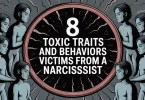There’s so much you think you know about narcissists that’s wrong. The real power they fear you’ll discover isn’t merely about exposing them it’s much more threatening. today I’m revealing what therapists will rarely tell you about NPD manipulation. If you’re dealing with a narcissist currently, you need to understand the psychological truth before your next interaction with them.
The Crucial Fear of Narcissists
Now, there’s one crucial thing that terrifies a narcissist beyond anything else, and once you understand it, your interactions with them will completely and fundamentally transform. I want you to think about something for a moment: Have you ever confronted a narcissist with evidence of their lies and manipulation?
Have you called them out on their behavior, such as gaslighting? What happened? If your experience is like most people’s, they probably didn’t crumble or even attempt to apologize. Instead, they likely doubled down, turned the tables on you, projected, or acted completely unfazed.
Why Exposure Isn’t Their Greatest Fear
Now, this is because criticism, exposure, or even being caught red-handed in lies aren’t actually what a narcissist fears the most. Surprising, right? We often think that catching them in their deception would be their ultimate nightmare, but that’s not what keeps them up at night.
You see, narcissists have developed several sophisticated and complex defense mechanisms. They’ve constructed entire personalities around protecting themselves from a specific psychological vulnerability, and understanding this vulnerability is the key to making sense of their otherwise baffling behaviors.
Related Topics:
Top 10 Reasons Narcissists Cheat: Understanding the Psychology Behind Their Infidelity
7 Non-negotiable Requirements Of Every INFJ Personality
Why Do Narcissists Always Want to Hurt Your Feelings?
The Origins of the False Self
Now, let me take you back to where it all begins. NPD personality structures typically form in childhood, often as a response to either excessive criticism or excessive praise.
In both scenarios, the child doesn’t develop a healthy, balanced sense of self. Instead, they create what psychologists call a “false self,” which is an idealized version of themselves that they present to the world as their mask. This false self acts as their armor to ostensibly protect the fragile wounded true self underneath.
The Fragile Core Beneath the Mask
The narcissist and this is crucial to understand beneath the grandiosity, the entitlement, and the apparent confidence, lies a deeply insecure person who is terrified of having their mask removed.
Now, this is where most people get it wrong. They believe the narcissist’s greatest fear is being exposed as a fraud or being seen as imperfect. While a narcissist doesn’t necessarily enjoy these experiences, there is something they fear far more profoundly.
What Truly Terrifies a Narcissist
What truly terrifies a narcissist is your emotional independence and your ability to remain unaffected by their manipulation tactics. Let that sink in for a moment. Narcissists depend entirely on controlling your emotional responses.
Their sense of power, their feeling of importance, and even their very identity are built upon their ability to provoke reactions from you. Whether it’s adoration, fear, confusion, or anger, they need you to react. When you stop reacting to them emotionally, you essentially cut off their power supply.
How Narcissists Manipulate Your Emotions
Think about how narcissists operate. They love-bomb you to create euphoria and attachment. They devalue you to trigger insecurity and a fear of abandonment. They gaslight you to make you doubt your perceptions and become dependent on them for a very twisted version of reality. They create chaos, then offer themselves as the solution and your savior.
All of these tactics have one thing in common: they’re designed to keep you on an emotional roller coaster that they control. Your emotions become the strings they pull to manipulate you as though you’re a puppet. That’s precisely why emotional independence terrifies them more than anything else.
The Power of Emotional Detachment
When you develop the ability to observe their behaviors without being emotionally triggered by them, something remarkable happens: their tactics stop working. The puppet strings they’ve attached to your emotions go slack, and suddenly, they have no way to control you.
I’ve worked with many clients who’ve experienced this firsthand. One client let’s call her Emma had been emotionally controlled by her narcissistic boss for years. Every critique would devastate her, every threat of firing would send her into a panic spiral, and every bit of rare praise would make her work twice as hard to please him.
But once Emma understood what was happening, she began to practice emotional detachment techniques. She would mentally observe her boss’s behavior as if watching a movie, noting the manipulative tactics without letting them affect her emotions.
Within weeks, something fascinating happened: her boss became increasingly desperate in his attempts to provoke her. When the subtle manipulation tactics stopped working, he became more obvious and extreme in his behaviors toward Emma. It was as if he could sense he was losing his grip on her, and it threw him into a panic.
The Narcissist’s Desperation
This is the pattern I see repeatedly. When narcissists realize they can no longer control their emotions and emotional states, they cycle through increasingly desperate manipulation tactics. This desperation reveals just how terrified they are of your emotional freedom.
Clarifying Emotional Independence
Now, I want to be clear about something: becoming emotionally independent does not mean you become cold or emotionless. What it means is that you develop the ability to choose your emotional responses instead of having them chosen for you.
It means you build a strong internal validation system so that you don’t need the narcissist’s approval or disapproval to determine your self-worth. This is why narcissists work so hard to isolate you from others they need to be the primary voice in your life, the main source of validation or criticism.
When you have a robust support network and a strong sense of self, their power diminishes dramatically, if not completely.
A Case Study: Michael’s Journey
I remember another client, Michael, who had been in a relationship with a narcissistic partner for almost a decade. His partner had systematically isolated him from friends and family, making him dependent on her for social interaction and emotional validation.
When Michael began reconnecting with old friends and building new relationships, his partner’s behavior became increasingly erratic. She cycled through love-bombing, rage, playing the victim, and even threats of self-harm desperate attempts to regain emotional control over him.
The Predictable Cycle of Control
What Michael experienced is typical. As you develop emotional independence, narcissists often go through a predictable phase in their attempts to regain control. First comes love-bombing, an attempt to reestablish the emotional high of the early relationship.
When that fails, they often move to intimidation, trying to activate your fear responses. Next comes playing the victim to trigger your guilt and sense of responsibility. Finally, many resort to smear campaigns, trying to damage your reputation or relationships with others in your support system.
Understanding this progression is powerful because it allows you to prepare yourself emotionally. Instead of being caught off guard by their tactics, you can recognize them as a predictable and standard response to your strengthening emotional independence.
Shifting the Focus: It’s About You, Not Them
This brings me to one of the most important insights about dealing with narcissists and NPD abuse: the goal is not to change or fix them. The goal is to change how their behavior affects you and how you react to it.
Many people spend years trying to make narcissists understand how they’ve hurt others, appealing to their non-existent empathy, or hoping they’ll eventually see the damage they’ve caused. But this approach almost always leads to frustration and disappointment.
Instead, focus on developing your emotional independence. This doesn’t necessarily mean ending the relationship although no contact is often your healthiest choice. Your freedom from their emotional control means changing the dynamic by changing how you respond.
When you can observe the rage of a narcissist without feeling frightened, their criticism without feeling worthless, their praise without feeling elated and validated, and their threats without feeling panicked, you have unlocked and mastered what truly terrifies them.
Understanding Their Behavior
This understanding gives you tremendous and valuable insight into why a narcissist behaves as they do. Those bewildering cycles of idealization and devaluation begin to make perfect sense when you realize they’re simply tools to keep you emotionally dependent on them.
The seemingly random episodes of creating chaos or conflict are calculated moves to keep you emotionally reactive and off balance. Their constant need for admiration and validation reveals their dependence on external sources to maintain their false sense of self.
Your Path Forward
So, what does this mean for you if you’re dealing with a narcissist in your life? It means that your path forward isn’t about trying to expose them or win an argument with them.
It’s about internally, steadily, and consistently building your emotional independence. It’s about developing such a strong and unshakable internal validation system that their opinions—whether good or bad—no longer define your sense of self-worth.
The Challenge and Possibility of Change
Now, is this easy? No, not especially if you’ve been in a relationship with a narcissist for a long time. Your emotional responses have been conditioned over months, years, even decades, and breaking that conditioning, which they’ve installed in a very calculated manner, takes time, support, and consistent practice.
But is it possible? Without question, yes, it is very possible. I’ve guided numerous clients through this process, and while the journey is not always smooth or linear, the liberation which is your lasting emotional freedom is achievable.
Using Triggers as Tools
As you begin this journey, remember that your emotional reactions are not weaknesses on your part—they’re valuable information to build your healing foundation. When you feel triggered by the behavior of a narcissist, ask yourself: What need or fear is being activated right now? What past wound is being touched? This awareness is the first step toward choosing your response with care instead of merely reacting to their manipulation.
The Shift in Power Dynamics
You’ll see, as you develop this ability to choose your responses, that you’ll also notice something remarkable: the power dynamic in the relationship fundamentally shifts. You are no longer their reactive puppet, constantly responding to their emotional provocations. Instead, you become the stable, consistent, and reasonable one, while the narcissist increasingly reacts to your calmness and emotional independence that you’ve worked so hard to develop.
The Ultimate Fear: Your Freedom
Now, remember: the narcissist’s greatest fear isn’t so much being exposed or criticized it’s your emotional independence. When you no longer need their validation, when their disapproval doesn’t devastate you, when their provocations don’t trigger you, that’s when they truly lose their power over you a vital step to transforming your interactions with them forever.
Transforming Your Relationships
Now that you understand this one thing that narcissists deeply fear your emotional independence you have access to the most powerful tool for transforming your relationships with the narcissistic people in your life. Know that this information is not just theoretical; it’s a practical pathway to your freedom from manipulation and emotional control. When you can observe the behavior of a narcissist without being emotionally triggered by it, you fundamentally change the power dynamic between you.
The Impact on Daily Life
Think about what this means for your daily life. No longer will their critiques devastate you. Their approval will not determine your self-worth. Their attempts to provoke you emotionally will fall flat. As this happens, you will notice something remarkable: they become increasingly predictable and far less powerful and influential in your life.
The Journey to Emotional Independence
This journey toward emotional independence is not always easy, especially if you’ve been in a relationship with a narcissist for a long time. The emotional patterns and responses have become deeply ingrained within you and your dynamic with a narcissist, and breaking free requires consistent practice, support, and guidance.
Personalized Support for Your Freedom
This is precisely why I’ve created personalized counseling sessions for people just like you at narcissismexposed.com. I work with clients one-on-one to develop customized strategies for your specific situations. Whether you’re dealing with a narcissistic partner, parent, boss, or friend, I am here with you to build the emotional independence that will transform these challenging relationships forever.
Your sessions with me will focus on developing and maintaining practical techniques to:
- Recognize manipulation tactics at the moment,
- Develop strong and healthy emotional boundaries,
- Build that critical internal validation system that makes you immune to NPD abuse and narcissistic control.






Leave a Comment